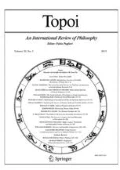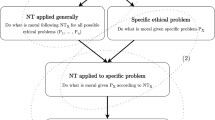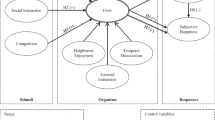Abstract
The aims of this paper are threefold: To show that game-playing (GP), the discipline of Artificial Intelligence (AI) concerned with the development of automated game players, has a strong epistemological relevance within both AI and the vast area of cognitive sciences. In this context games can be seen as a way of securely reducing (segmenting) real-world complexity, thus creating the laboratory environment necessary for testing the diverse types and facets of intelligence produced by computer models. This paper aims to promote the belief that games represent an excellent tool for the project of computational psychology (CP). To underline how, despite this, GP has mainly adopted an engineering-inspired methodology and in doing so has distorted the framework of cognitive functionalism. Many successes (i.e. chess, checkers) have been achieved refusing human-like reasoning. The AI has appeared to work well despite ignoring an intrinsic motivation, that of creating an explanatory link between machines and mind. To assert that substantial improvements in GP may be obtained in the future only by renewed interest in human-inspired models of reasoning and in other cognitive studies. In fact, if we increase the complexity of games (from NP-Completeness to AI-Completeness) in order to reproduce real-life problems, computer science techniques enter an impasse. Many of AI’s recent GP experiences can be shown to validate this. The lack of consistent philosophical foundations for cognitive AI and the minimal philosophical commitment of AI investigation are two of the major reasons that play an important role in explaining why CP has been overlooked.
Similar content being viewed by others
References
Agre, P. E.: 1995, ‘The Soul Gained and Lost: Artificial Intelligence as a Philosophical Project’, Constructions of the Mind: Artificial Intelligence and the Humanities 4.
P.E. Agre (1997) Computation and Human Experience Cambridge University Press Cambridge, MA Occurrence Handle10.1017/CBO9780511571169
V. Allis (1994) Searching for Solutions in Games and Artificial Intelligence University of Limburg Maastricht
Berliner, H.: 2000, ‘AI’s Greatest Trends and Controversies’, IEEE Intelligent Systems, January/February.
D. Billings A. Davidson J. Schaeffer D. Szafron (2002) ArticleTitle‘The Challenge of Poker’ Artificial Intelligence 134 201–240 10.1016/S0004-3702(01)00130-8 Occurrence Handle10.1016/S0004-3702(01)00130-8
Binsted, K., Ritchie, G.: 1994, ‘An Implemented Model of Punning Riddles’, Proceedings of the 12th National Conference on Artificial Intelligence (AAAI-94), pp. 296–301.
D. G. Bobrow T. Winograd (1979) ArticleTitle‘KRL: Another Perspective’ Cognitive Science 3 29–42 Occurrence Handle10.1207/s15516709cog0301_2
S. Bringsjord (1998) ArticleTitle‘Chess is too Easy’ MIT’s Technology Review 101 23–28
Buro, M.: 1995, ‘Logistello: A Strong Learning Othello Program’, 19th Annual Conference Gesellschaft für Klassifikation, March.
D. J. Chalmers (1992) ‘Subsymbolic Computation and the Chinese Room’ J. Dinsmore (Eds) The Symbolic and Connectionist Paradigms: Closing the Gap Lawrence Erlbaum Associates Hillsdale, NJ
Cook, S. A.: 1971, ‘The Complexity of Theorem-Proving Procedures’, Conference Record of Third Annual ACM Symposium on Theory of Computing, pp. 151–158.
D. Davidson (1986) ‘A Coherence Theory of Truth and Knowledge’ E. LePore (Eds) Truth and Interpretation: Perspectives on the Philosophy of Donald Davidson Basil Blackwell Oxford, MA
H. Dreyfus (1972) What Computers Can’t Do: A Critique of Artificial Reason Harper and Row New York, NY
H. L. Dreyfus (1981) ‘From Micro-Worlds to Knowledge Representation: AI at an Impasse’ J. Haugeland (Eds) Mind Design. Bradford Book Cambridge, MA
Dummett, M. 1975 ‘What is a Theory of Meaning’, in S. Guttenplan (ed.) Mind and Language. Cambridge, MA: Cambridge.
Ernandes, M., Gori, M. 2004, ‘Likely-Admissible and Subsymbolic Heuristics’, in Proceedings of the 16th European Conference on Artificial Intelligence, pp. 613–617.
G. Evans (1982) ‘The Varieties of Reference’ J. McDowell (Eds) Semantic Theory and Tacit Knowledge. Clarendon Pres Oxford 322–342
J. Fodor E. LePore (1992) Holism: a Shopper’s Guide Blackwell Oxford, MA
H. Gardner (1983) Frames of Mind: The Theory of Multiple Intelligences Basic Books New York, NY
Ginsberg, M. L., Frank, M., Halping, M. P., Torrance, M. C.: 1990, ‘Search Lessons Learned from Crossword Puzzles’, Proceedings of the Eighth National Conference on Artificial Intelligence (AAAI-90), pp. 210–215.
F. Gobet (1991) ArticleTitle‘Chess Players’ Thinking Revisited’ Swiss Journal of Psychology 57 18–32
F. Gobet H. A. Simon (1996) ArticleTitle‘The Roles of Recognition Processes and Look-Ahead Search in Time-Constrained Expert Problem Solving: Evidence from Grandmaster Level Chess’. Psychological Science 7 52–55 Occurrence Handle10.1111/j.1467-9280.1996.tb00666.x
I. Harel S. Papert (1983) Constructionism Ablexs Norwood, NJ
Junghanns, A., Schaeffer, J.: 1997, ‘Search Versus Knowledge in Game-Playing Programs Revisited’, Proceedings of the 15th International Joint Conference on Artificial Intelligence (IJCAI-97), pp. 692–697.
J. Juul (2003) ‘The Game, the Player, the World: Looking for a Heart of Gameness’ M. Copier J. Raessens (Eds) Level Up: Digital Games Research Conference Proceedings Universiteit Utrech Utrecht 30–45
Leibniz, G. 1875–1890 (1666), ‘Dissertatio de Arte Combinatoria’, in C. I. Gerhardt (ed.), Die philosophischen Schriften von Gottfried Wilhelm Leibniz, vol. IV, Berlin: Weidman.
M.L. Littman (2000) ArticleTitle‘Review: Computer Language Games’ Computer and Games 134 396–404
M. L. Littman G. A. Keim N. Shazeer (2002) ArticleTitle‘A Probabilistic Approach to Solving Crossword Puzzles’ Artificial Intelligence 134 23–55 10.1016/S0004-3702(01)00114-X Occurrence Handle10.1016/S0004-3702(01)00114-X
J. C. Mallery R. Hurwitz D. Gavan (1987) ‘Hermeneutics: From Textual Explication to Computer Understanding?’ S. C. Shapiro (Eds) Encyclopedia of Artificial Intelligence - I Edition Wiley New York
D. Marr (1980) Vision Houghton Mifflin Boston, MA
H. R. Maturana (1980) ‘Biology of Cognition’ H. R. Maturana F. Varela (Eds) Autopoeisis and Cognition: The Realization of the Living Reidel Dordrecht 2–62
M. Minsky (1981) ‘A Framework for Representing Knowledge’ J. Haugeland (Eds) Mind Design: Philosophy, Psychology, Artificial Intelligence. MIT Press Cambridge, MA 95–128
M. L. Minsky (1968) Semantic Information Processing MIT Press Cambridge, MA
M. Muller (2002) ArticleTitle‘Computer Go’ Artificial Intelligence 134 145–179 10.1016/S0004-3702(01)00121-7 Occurrence Handle10.1016/S0004-3702(01)00121-7
A. Newell H. Simon (1972) Human Problem Solving Prentice-Hall Englewood Cliffs, NJ
InstitutionalAuthorNameNews-Nature (2004) ArticleTitle‘Program Crosses Web to Fill in Puzzling Words’ Nature 431 620 Occurrence Handle10.1038/431620a
B. Pell (1992) ‘Metagame: A New Challenge for Games and Learning’ H. J. Herik Particlevan den L.V. Allis (Eds) Heuristic Programming in Artificial Intelligence 3 - The Third Computer Olympiad Ellis Horwood Limited Chichester
J. Piaget (1951) Play, Dreams and Imitation in Childhood Heinemann London
H. Putnam (1960) ‘Minds and Machines’ S. Hook (Eds) Dimensions of Mind: A Symposium New York University Press New York, NY 148–179
Z. W. Pylyshyn (1989) ‘Computing in Cognitive Science’ M. I. Posner (Eds) Foundations of Cognitive Science MIT Press Cambridge, MA 70
D.E. Rumelhart McClelland J.L. (1986) Parallel Distributed Processing MIT Press Cambridge, MA
J. Schaeffer J. Culberson N. Treloar B. Knight P. Lu D. Szafron (1992) ArticleTitle‘A World Championship Caliber Checkers Program’ Artificial Intelligence 53 273–290 10.1016/0004-3702(92)90074-8 Occurrence Handle10.1016/0004-3702(92)90074-8
S. C. Shapiro (1992) ‘Artificial Intelligence’ S. C. Shapiro (Eds) Encyclopedia of Artificial Intelligence. Wiley New York, NY 54–57
Sharoff, S.: 1995, ‘Philosophy and Cognitive Science’, Constructions of the Mind: Artificial Intelligence and the Humanities, 4.
B. Suits (1990) The Grasshopper: Games, Life and Utopia David R. Godine Publisher Boston MA
Tesauro, G.: 1995, ‘Temporal Difference Learning and TD-Gammon’, Communications of the ACM, 38.
J. Neumann Particlevon O. Morgenstern (1944) Theory of Games and Economic Behaviour Princeton University Press Princeton, NJ
D. Wilkins (1980) ArticleTitle‘Using Patterns and Plans in Chess’ Artificial Intelligence 14 165–203 10.1016/0004-3702(80)90039-9 Occurrence Handle10.1016/0004-3702(80)90039-9
C.E. Zsambok G.A. Klein (1997) Naturalistic Decision Making Erlbaum Mahwah, NJ
Author information
Authors and Affiliations
Corresponding author
Rights and permissions
About this article
Cite this article
Ernandes, M. Artificial Intelligence & Games: Should Computational Psychology be Revalued?. Topoi 24, 229–242 (2005). https://doi.org/10.1007/s11245-005-5090-0
Issue Date:
DOI: https://doi.org/10.1007/s11245-005-5090-0




